Over the last decade, bootcamps have become an increasingly popular way of acquiring tech job skills. In our latest report on the state of the bootcamp market, we noted that over 44,000 people attended or graduated from a bootcamp in 2020 alone.
The need for bootcamps, and other job-oriented training programs that help people build technical skills, is clear. In a recent report, Microsoft estimated that “the total number of technology-oriented jobs” will increase from “41 million in 2020 to 190 million in 2025.” This statistic illustrates the huge role that jobs involving technology will play in the global economy. To fuel this growth, we need comprehensive technical training programs.
The job training market was worth an estimated $15.9 billion in 2020, according to IBIS World. While bootcamps account for only a small portion of this market, their career-oriented focus, long track record of training, and resilience throughout the COVID-19 pandemic suggest to us that bootcamps will play a larger role in job training in the future.
Given both the recent growth of the bootcamp market and our high expectations for its continued expansion, we believe it is crucial to gather more data on the bootcamp experience. For instance, we want to know: Why are people going to bootcamps? To what extent does attending a bootcamp impact one’s earning potential?
To learn more about the bootcamp experience, we conducted a survey of bootcamp applicants, students, and graduates. In our survey, we looked at five specific areas of bootcamps:
- Bootcamp decisions
- The applicant experience
- The student experience
- The experience graduates have when they enter the job market
- Bootcamp student and graduate demographics
We divided each of these factors into a series of questions, which formed the basis of our survey. Collectively, these five factors will help us paint a picture of what the bootcamp experience looks like and thus shed more light on the efficacy of bootcamps as a method of training.
Key Findings
Below are our key findings based on 2,168 respondents to our survey.
- The top reason participants wanted to enroll in a bootcamp was “I wanted a higher salary.”
- 57% of participants did not consider getting a computer science degree before applying to a bootcamp.
- Upfront payment is the most popular way of financing a bootcamp. However, students and graduates have relied on a range of financing methods.
- Most participants spent less than one month on the enrollment process, from beginning research to getting accepted into a school.
- 74% of participants found a job related to their field of study after graduation.
- The average bootcamp grad spent less than six months in career transition, from starting a bootcamp to finding their first job.
- 64% of participants stated that their bootcamp prepared them well for their first job.
- 81% of participants stated they felt more confident about their job prospects after attending a bootcamp.
- 84% of participants would recommend bootcamps to a friend.
- 74% of participants had attained a degree before attending a bootcamp.
- Almost two-thirds of participants studied at a bootcamp while living in an urban area.
- The average bootcamp student applied to 1.5 bootcamps and pursued 1.8 careers before attending their bootcamp.
- 91% of participants spent less than one hour filling out their initial bootcamp application.
- 66% of participants spent less than one month thinking about going to a bootcamp before submitting an application.
- 90% of participants spent less than one month applying to a bootcamp before starting.
- 85% of participants were asked to complete pre-work before enrolling in a bootcamp.
- While 43% of participants prefer to learn in person, 20.4% of participants prefer to learn online. The remaining 36.6% prefer some combination of in-person and online learning.
- 73% of participants would feel comfortable studying in person once more people have been vaccinated against COVID-19.
- The service that bootcamp students, grads, and applicants would most like to have or have had during the application process was the “Ability to speak directly with alumni.”
- 70% of bootcamps offered portfolio projects as part of their syllabus.
- 71% of bootcamps offered career and employability workshops as part of their career services.
- 46.6% of respondents were male and 46.5% were female. A further 2.2% said they were gender non-conforming and 1.6% identified as transgender.
- 50% of respondents described themselves as white and 42.7% of respondents placed themselves in a non-white group.
- 96.8% of respondents were 21 or older and only 3.4% of respondents were over 50. This shows that bootcamps are most popular among people who are of working age but not close to retirement.
Methodology
This report consists of data collected from 2,168 qualified bootcamp applicants, students, and graduates. See Appendix A for a list of the schools represented in the survey. The survey was conducted between April 17th, 2021 and May 19th, 2021. The breakdown of survey respondents was as follows:
- Applicants: 27.5%
- Students: 20.6%
- Graduates: 51.9%
To distribute the survey, we contacted all the bootcamps in our directory and asked them to send the survey to their student bodies. We also conducted outreach to our community via email so we could reach students, applicants, and graduates directly. Lastly, we made use of social media to expand the reach of our survey as much as possible.
Survey respondents were given a different series of questions depending on whether they were an applicant, student, or graduate. In each section of this paper, we note which group(s) of participants were asked to answer a particular set of questions.
As an incentive for participation, we offered $50 Amazon gift cards to five random participants, who were selected after the survey was concluded.
A full list of the questions presented to survey respondents can be found in Appendix B.
Key Decisions That Participants Made Before Their Bootcamp
The questions in this section were asked to all participants in the survey, which accounts for bootcamp applicants, students, and graduates.
Why did you decide to apply to join a bootcamp program?
Enrolling in a bootcamp is a big decision. Bootcamps are a large investment of one’s time and money. That’s why we decided to ask people why they wanted to join a bootcamp program.
Fifty percent of survey respondents rated “I wanted a higher salary” as a top reason why they decided to apply to join a bootcamp. This was closely followed by “I wanted to do more creative work,” which was an answer given by 48 percent of respondents.
The second and third top reasons why people decided to apply to join a bootcamp — “to do more creative work” and “to build technology” — are not directly related to money or job insecurity. This shows that many people see participating in a bootcamp as a way to pursue a career that feeds their desire to create something, rather than just to enhance their earning prospects or job security.
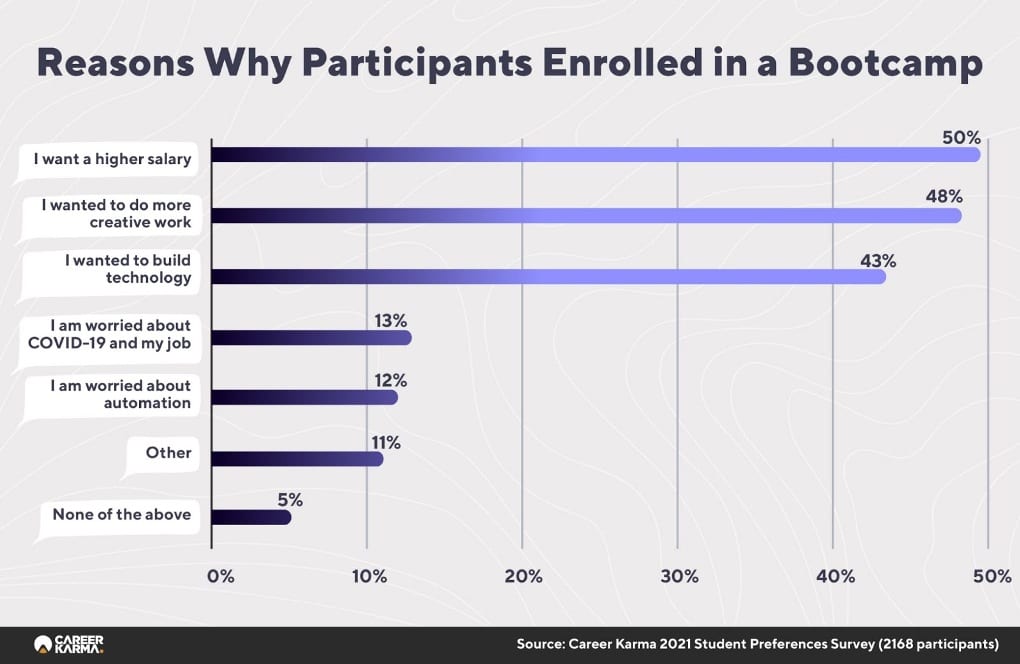
Did you consider getting a traditional four-year computer science degree before applying to bootcamp?
Many people see a bootcamp as an alternative to computer science (CS) degrees. About 56.5 percent of respondents to this question indicated that they did not think about a CS degree. This tells us that a clear majority of people see bootcamps as a viable method of training in themselves. About 34.8 percent did consider getting a CS degree before applying to a bootcamp.
Interestingly, 8.7 percent of respondents indicated they already had a CS degree. This tells us that bootcamps are not exclusively for people who have little to no technical training or education. Some people who have already completed a CS degree have gone on to attend a bootcamp.
This question excludes responses from people who attended a bootcamp to study a field that does not involve extensive coding (i.e. technology sales, UX/UI design). Respondents who answered “Other” were not included in our analysis for this statistic.
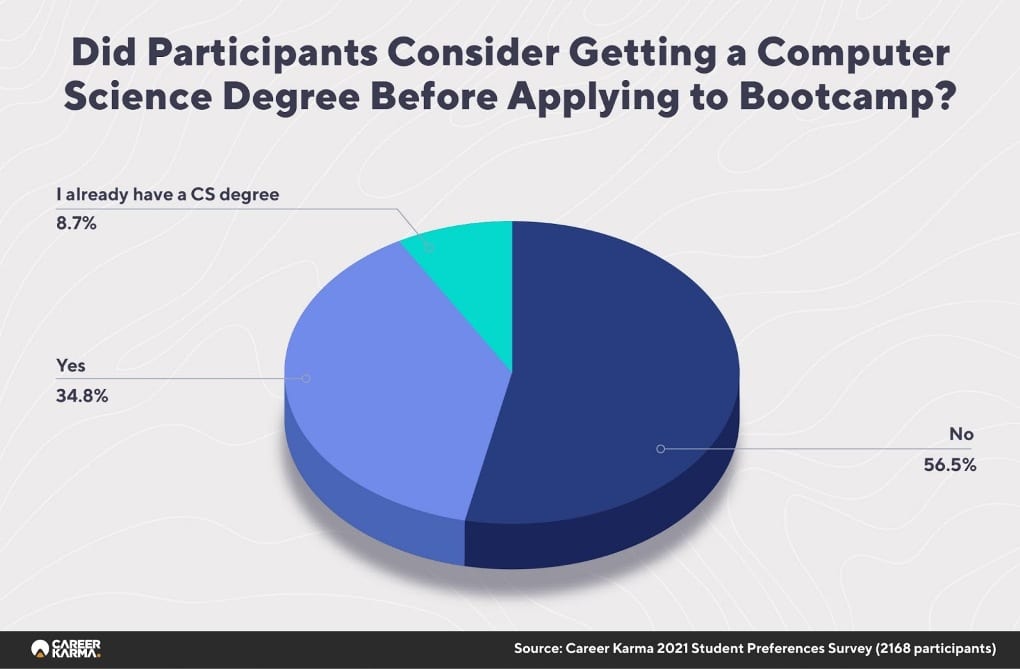
Decisions Made by Bootcamp Students and Graduates
The following question was displayed to all students and graduates. Students and graduates together accounted for 1,572 responses to our survey.
How did you finance your bootcamp education?
We asked respondents to state all of the methods they used to finance their bootcamp education. The most popular method of financing a bootcamp was upfront payment. About 36 percent of respondents said they paid for their bootcamp education upfront.
With that said, bootcamp students and graduates have relied on a wide range of financing options, from family support to income share agreements (ISAs) to deferred tuition. This was expected because, for many, a single financing option is not enough. For instance, one might choose to pay upfront but may also ask for family support to do so.
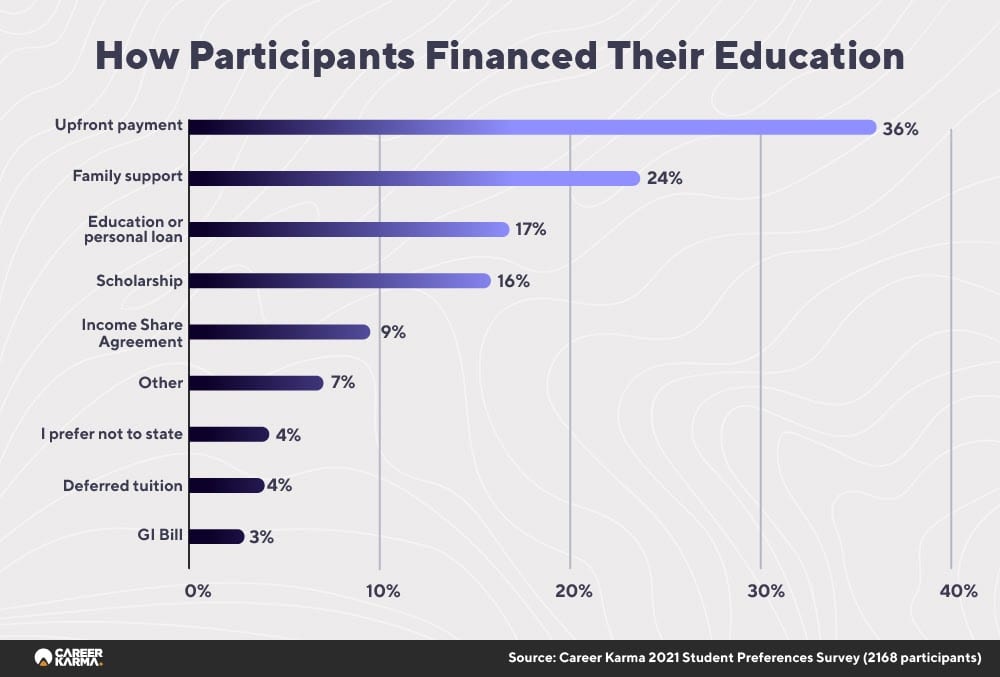
Average Student Experience at Bootcamp
The following questions were posed to all students and graduates who participated in the survey. This accounted for 1,572 respondents.
Which of the following career services have been or were offered to you during your bootcamp education?
Career services are marketed as an important part of many bootcamps. This is expected because bootcamps are seen as a faster way to transition into a particular career. To learn more about what the average career offering looks like, we asked people about what career services they were offered.
About 71 percent of students and graduates said that they were offered “career and employability workshops.” This was the most common career offering among bootcamps. However, other career services are offered by bootcamps, as you can see in the chart below.
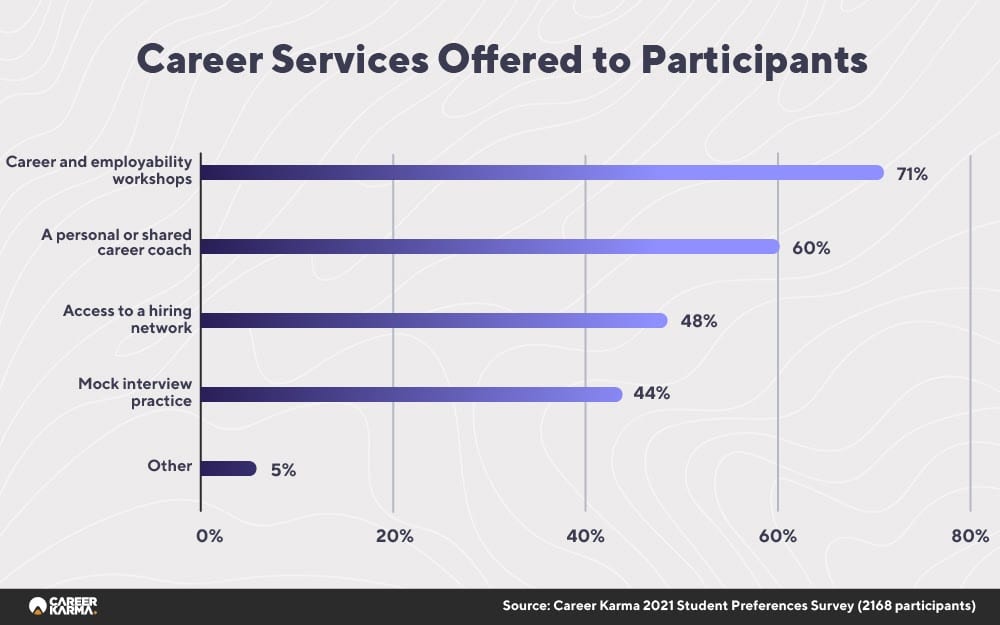
Which of the following career services have you taken advantage of or did you take advantage of in your bootcamp education?
By asking about how many people have taken advantage of a particular career service, we can learn more about which career services are most used by students and graduates.
We found that career and employability workshops were the most popular resource that students and graduates have taken advantage of at bootcamps. However, only 61 percent of people said they took advantage of this service, versus the 71 percent who said it was offered to them at a bootcamp.

"Career Karma entered my life when I needed it most and quickly helped me match with a bootcamp. Two months after graduating, I found my dream job that aligned with my values and goals in life!"
Venus, Software Engineer at Rockbot
The rate at which students use career services is lower than the rate at which bootcamps offer them, as we can see by comparing the chart below to the previous one. This is expected because not every student or graduate will need access to a particular service. Some people may already be in their job search by the time they are offered career services or may prefer to look for a job on their own using the skills they learned at a bootcamp.
Below are the percentage differences between how many people were offered each service and how many people used each service.
- Career and employability workshops: Used by 10% fewer participants than the number who reported this service was offered to them.
- A personal or shared career coach: Used by 8% fewer participants.
- Access to a hiring network: Used by 11% fewer participants.
- Mock interview practice: Used by 11% fewer participants.
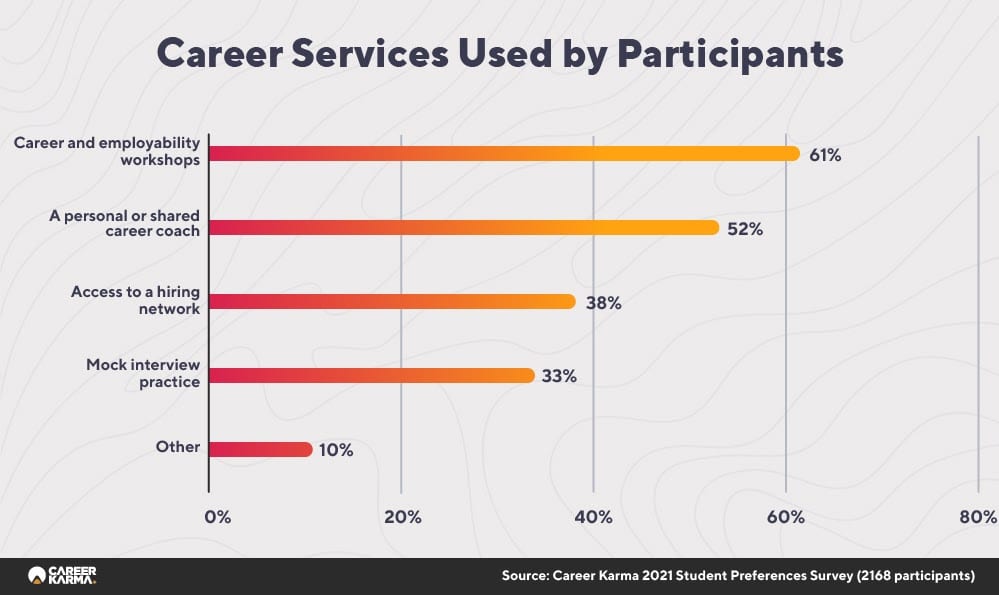
Which of the following programming services have been offered to you or were offered to you during your education?
Similar to our questions on career services, we wanted to learn about which programming services were offered to students. Since our study was mainly focused on bootcamps, this question was displayed to all students and grads who filled out the survey.
We found that the opportunity to work on portfolio projects is the most common programming service offered by bootcamps. About 70 percent of students and graduates were asked to work on portfolio projects at the bootcamp at which they studied.
We also found that bootcamps offer a range of programming services. The chart below shows that the six options included as potential responses to this question (excluding “Other”) were offered to at least 35 percent of respondents.
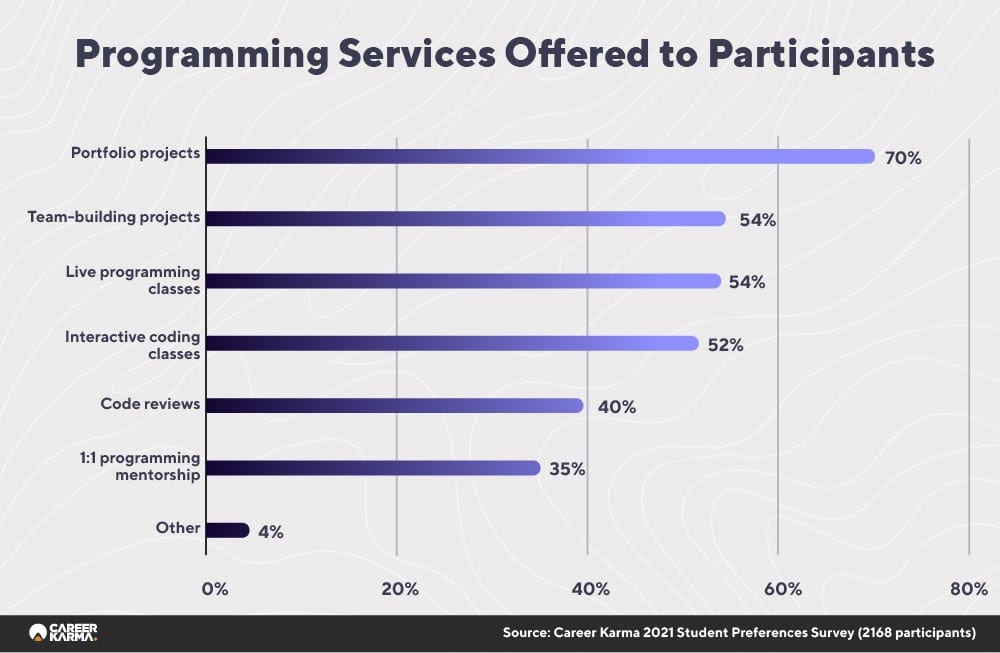
Which of the above programming services have you taken advantage of or did you take advantage of in your bootcamp education?
Portfolio projects were the most impactful part of students’ bootcamp experience. About 68 percent of students and graduates in our survey worked on portfolio projects at their bootcamp.
We found there was no gap larger than 3.4 percent between the number of people offered a programming service (e.g., portfolio projects, live programming classes, team-building projects) and the number of people who used that service.
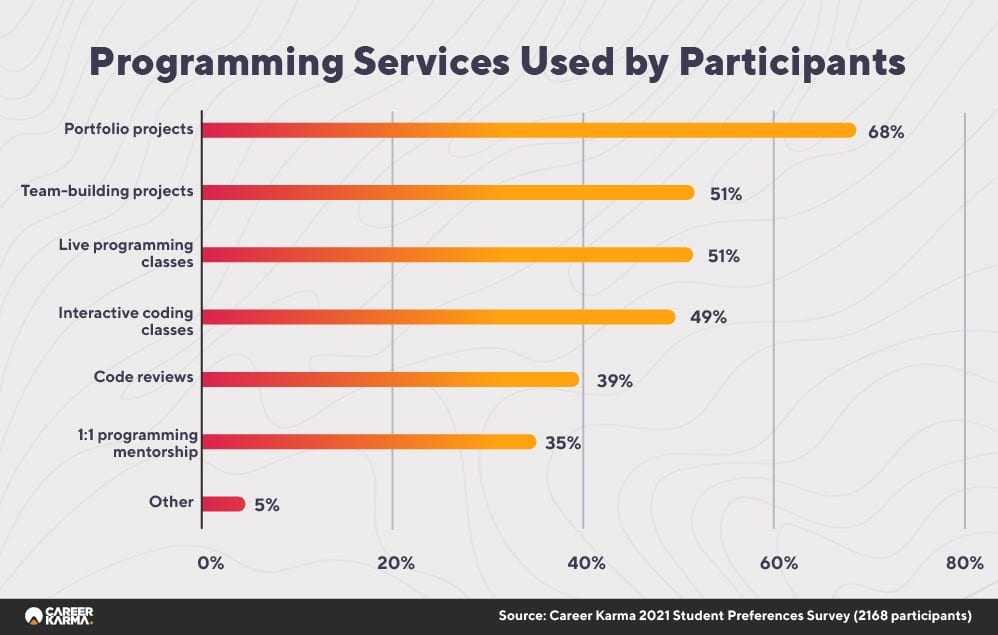
How long did it take you to enroll in bootcamp, from starting your research to being accepted?
The research and enrollment process need not be long. About 36 percent of respondents said it took them “less than 1 month” from start to finish, and 83 percent of respondents spent three months or less.
This shows that the bootcamp enrollment process is by no means a bottleneck for most people who want to transition into a new career. We must state, however, that our conclusion is likely influenced by the fact a lot of survey participants were members of the Career Karma community. Our community helps people apply to and enroll in bootcamps, which can speed up the process of finding a training program.
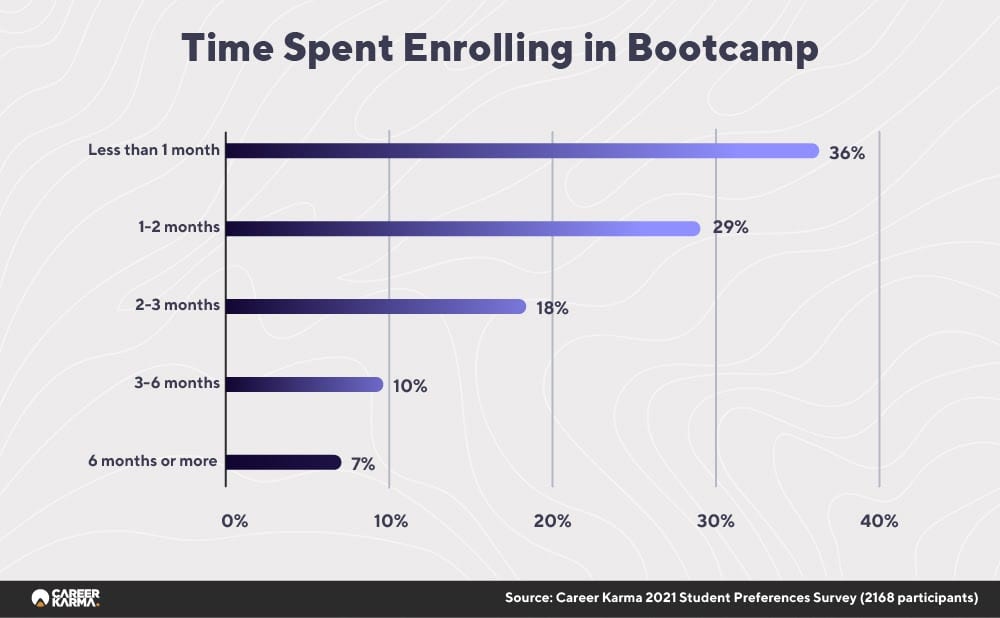
Which of the following were influential in your search for a bootcamp program to attend?
We wanted to find out what sorts of information bootcamp students and graduates relied on to decide which bootcamp to attend. We found that online reviews are the most popular resource used by students and grads when looking for a bootcamp program. About 50 percent of bootcamp students and grads used online reviews during their bootcamp search.
However, many other sources of information influenced our respondents. Bootcamp websites, discussions with friends, and bootcamp events were all used by 20 percent or more of the students and grads in our survey.
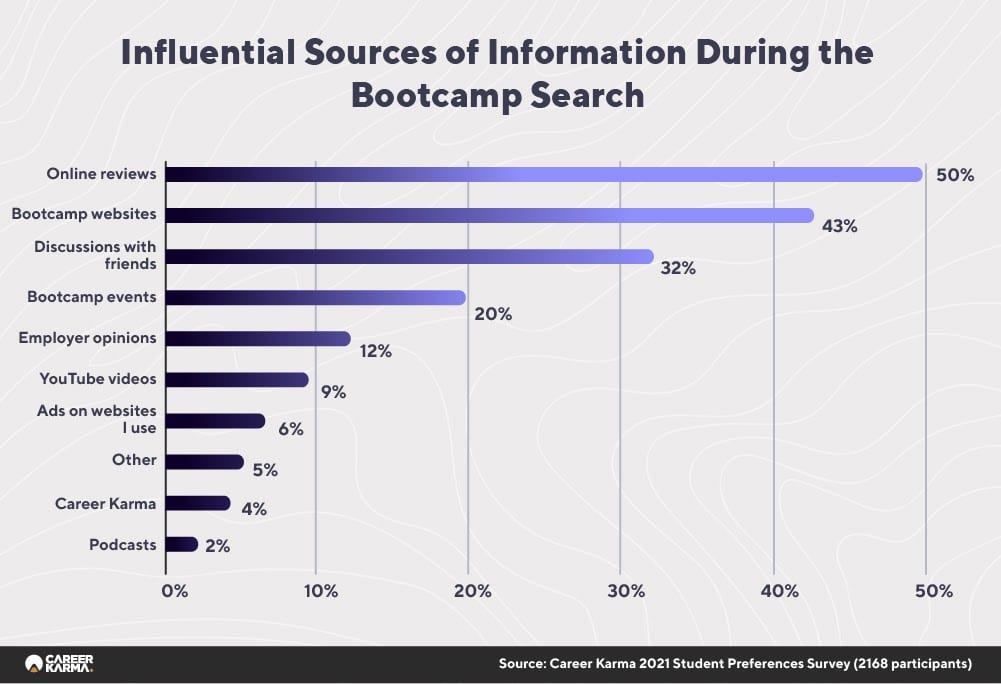
Transition Between Bootcamp and the Job Market
Graduates were the only respondents asked to fill out this section of the survey. In total, 1,125 graduates filled out the survey and were presented with the questions in this section.
Which of the following best describes your work status?
Full-time employment, at 67.9 percent of respondents, was the most common type of employment that bootcamp graduates entered into after leaving their bootcamp. A further 4.1 percent of respondents said they were in part-time employment. In total, 84.2 percent of respondents said they were engaged in some form of work, and 13.4 percent of respondents indicated they were unemployed and looking for work.
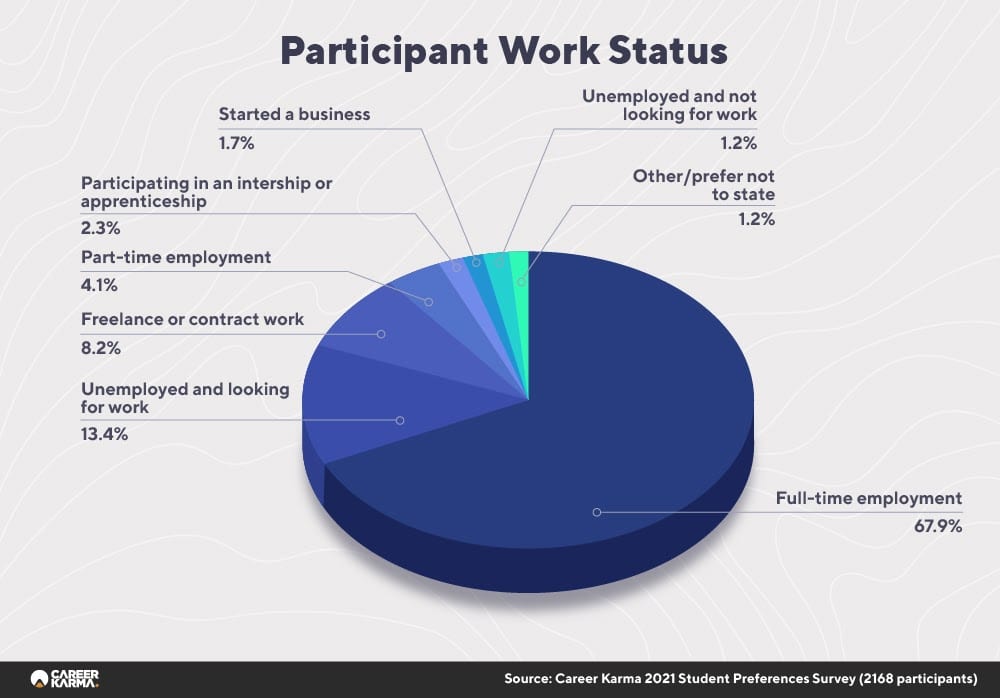
Is your current job related to your field of study at bootcamp?
About 74 percent of people said the job they are in now is related to what they studied at their bootcamp. This suggests that a majority of people who attend a bootcamp end up finding a job that uses the skills they acquired there.
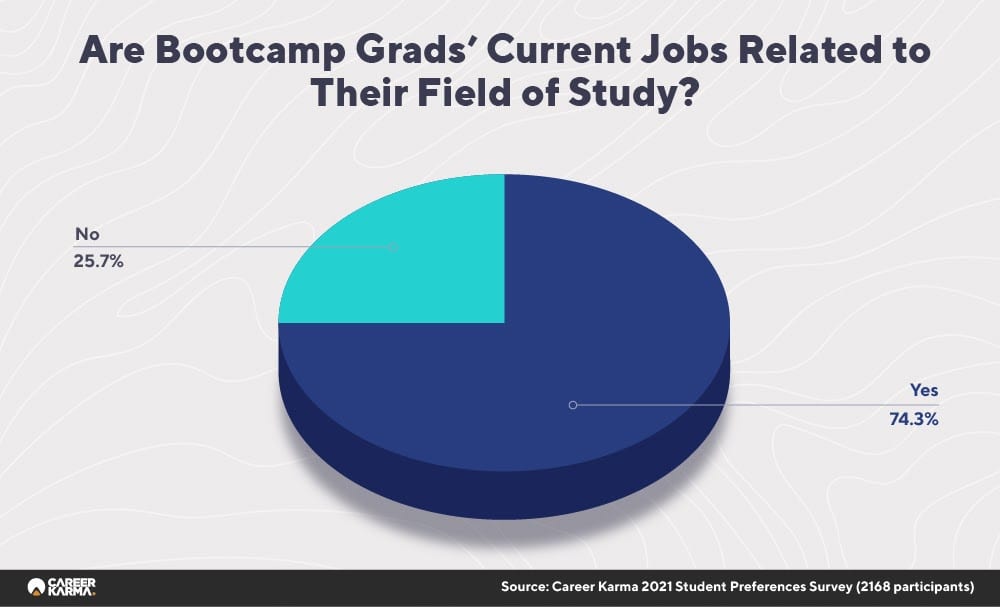
How much do you currently earn per year? (Salaries after bootcamp)
The salaries bootcamp graduates earn are varied, with 66.9 percent of bootcamp graduates earning over $30,000 per year, and 49.3 percent of graduates earning over $50,000 per year. Notably, 13.7 percent of graduates said they earned a salary higher than $100,000. This shows that many bootcamp graduates go on to earn significant salaries. For context, the median annual salary in the United States across all occupations is $41,950.
The median annual salary for computer and information technology occupations is $91,250. It is important to note most of our respondents graduated from their bootcamp within the last four years, and so most of them are early in their careers. As a result, they are not likely to have realized their full potential.
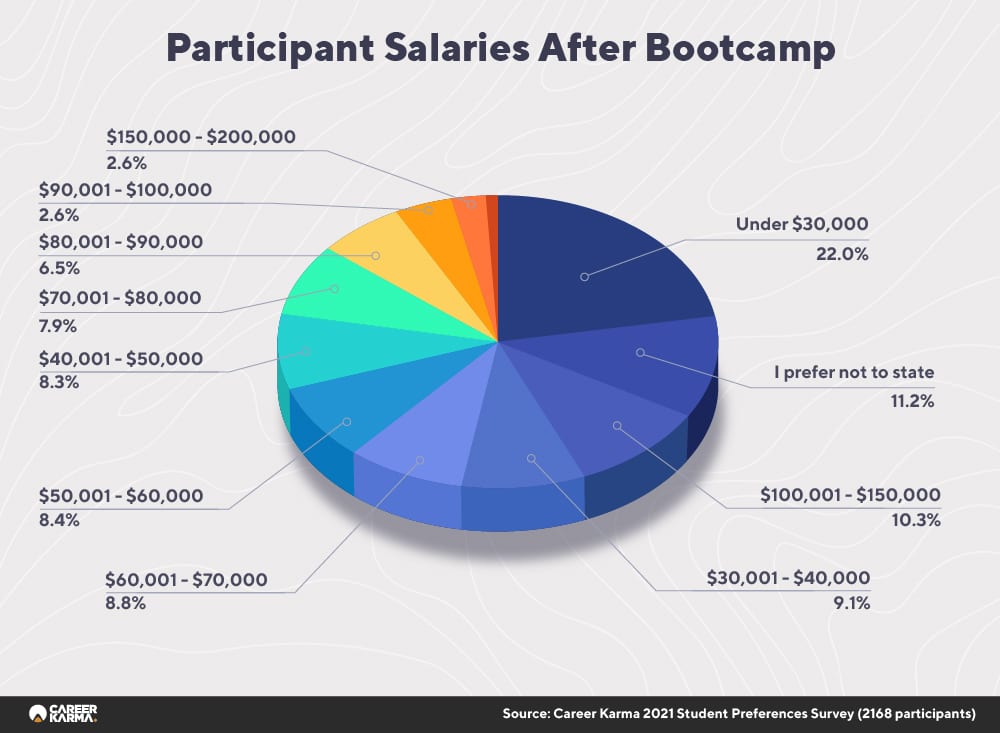
How much did you earn before attending bootcamp? (Salaries before bootcamp)
Without context, the information above does not tell us the extent to which a bootcamp impacts one’s earning potential. To give us the context we needed, we asked participants how much they earned before attending a bootcamp.
The differences between how much bootcamp graduates earned before and after their bootcamp are laid out in the following table.
| Salary Band | Before Bootcamp | After Bootcamp | Salary Difference |
| Under $50,000 | 59.4% | 43.5% | 15.9% Decrease |
| $50,001 – $100,000 | 27.6% | 36.5% | 8.9% Increase |
| $100,001 – $200,000 | 5.1% | 10.5% | 5.4% Increase |
| $200,000+ | 0.5% | 0.8% | 0.3% Increase |
As you can see above, almost 16 percent of people moved from the “Under $50,000” salary band into a higher band. There are increases in each of the three highest salary bands. This information reflects a positive trend in the earning potential of bootcamp graduates, but it does not tell us the size of this increase nor how long it took a graduate to earn a higher salary.
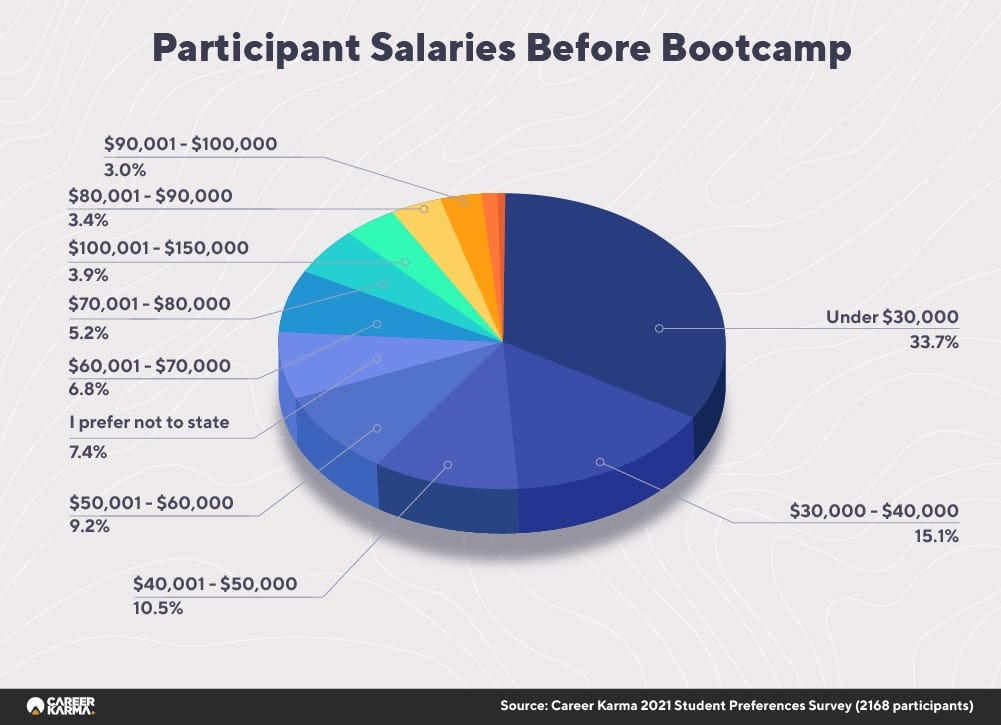
How many months did you spend transitioning careers, from deciding to attend bootcamp to finding your first job?
For many, bootcamps are considered a quick way to switch careers. We wanted to find out exactly how much time people who went to a bootcamp spent in transition.
We found that 39 percent of people spent less than six months from deciding to attend bootcamp to finding their first job. About 78 percent of respondents spent less than one year from deciding to attend bootcamp to finding a job. From this data, we can see that bootcamps do indeed enable quick career transitions for those who commit to a bootcamp program.
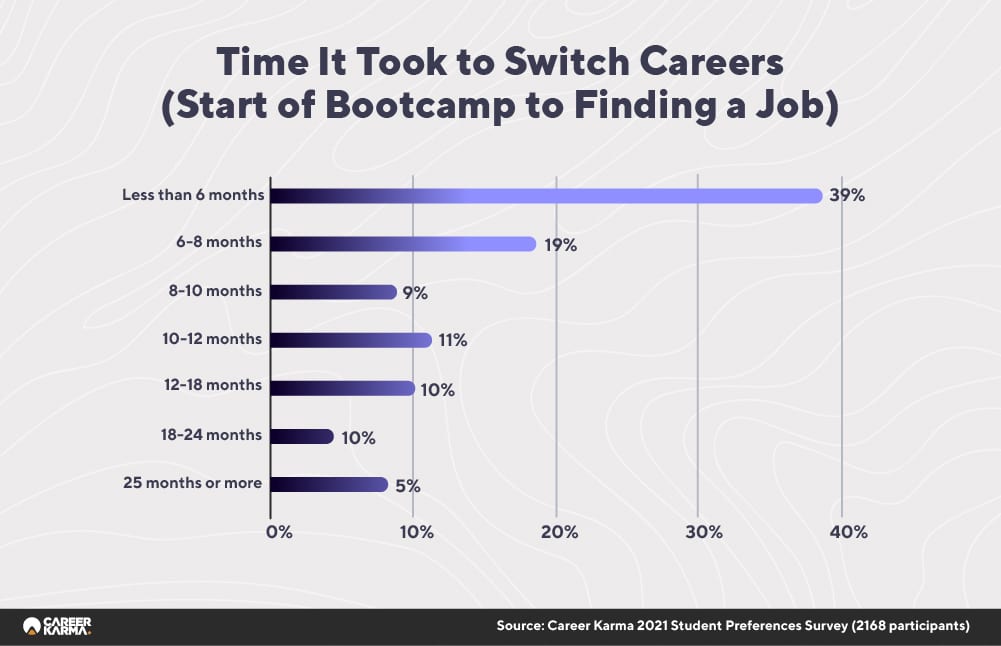
Approximately how many months were there between you graduating the bootcamp and finding a job related to your field of study at bootcamp?
Transitioning from a bootcamp to a job is a quick process for many. We found that 35 percent of respondents found a job within three months or less of graduating. A further 15 percent found a job in the field they studied at their bootcamp before graduating.
A total of 68 percent had a job related to their field of study either before graduating or within six months of graduating.
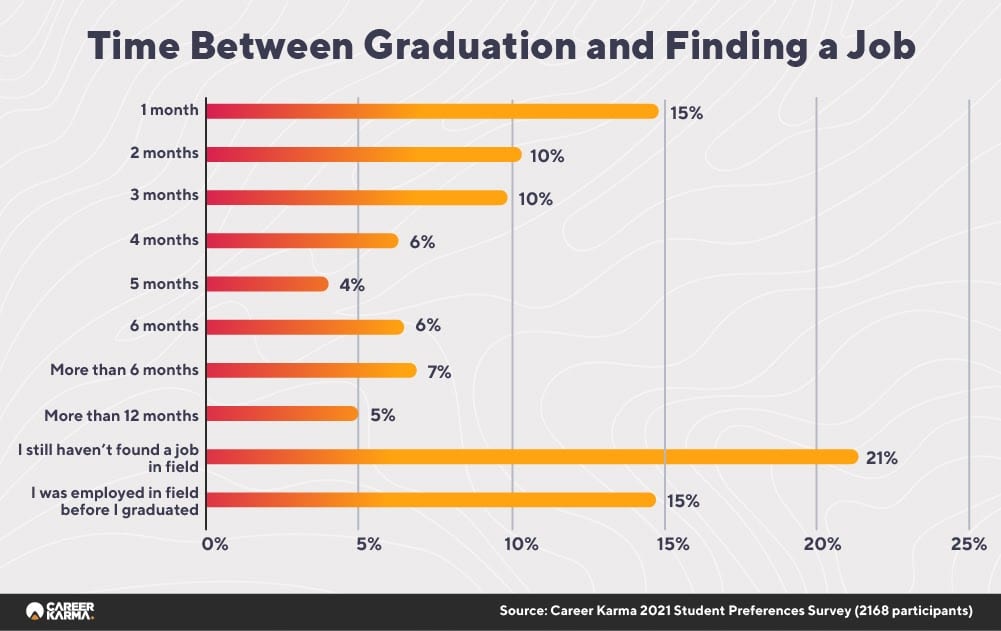
How much do you agree with the statement, “Bootcamp prepared me well for my first job”?
A key proposition behind the value of bootcamps is that they can prepare people for a job in a short period of time. Our data suggests that bootcamps are living up to this proposition. Of our respondents for this question, 64 percent either agreed or strongly agreed with the statement, “Bootcamp prepared me well for my first job.” A further 22 percent neither agreed nor disagreed.
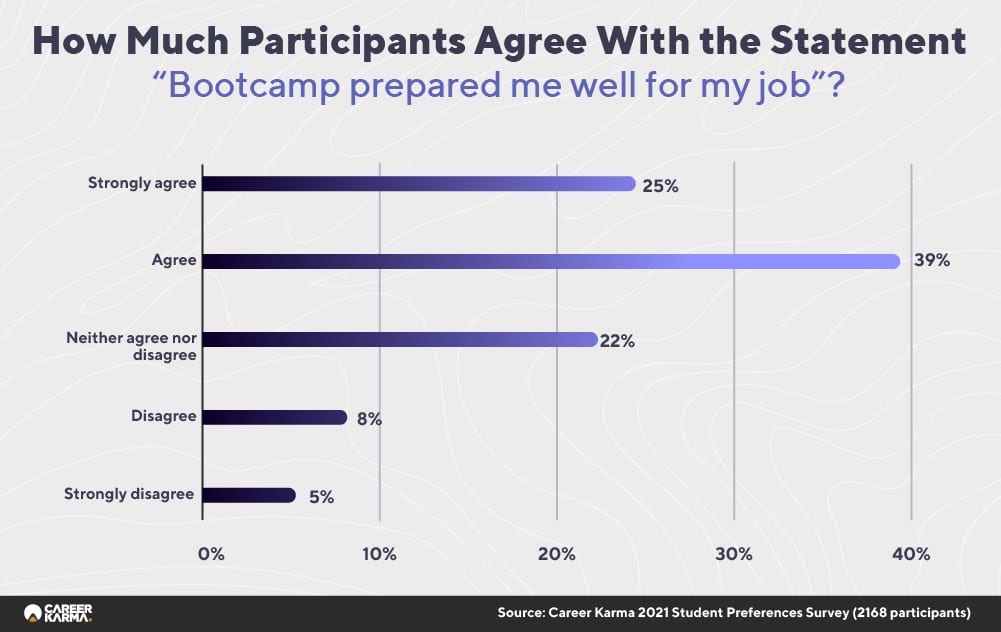
How much do you agree with the statement, “I feel more confident in my future job prospects now than I did before attending bootcamp”?
Bootcamps also play a role in helping people build confidence in their career prospects.
This is especially important considering that many people who go through a bootcamp usually have little to no technical background. For those who have no prior experience in their field of study, confidence is crucial to their future success.
About 81 percent of respondents agreed or strongly agreed with the statement, “I feel more confident in my future job prospects now than I did before attending bootcamp.” A further 11 percent neither agreed nor disagreed with this statement.
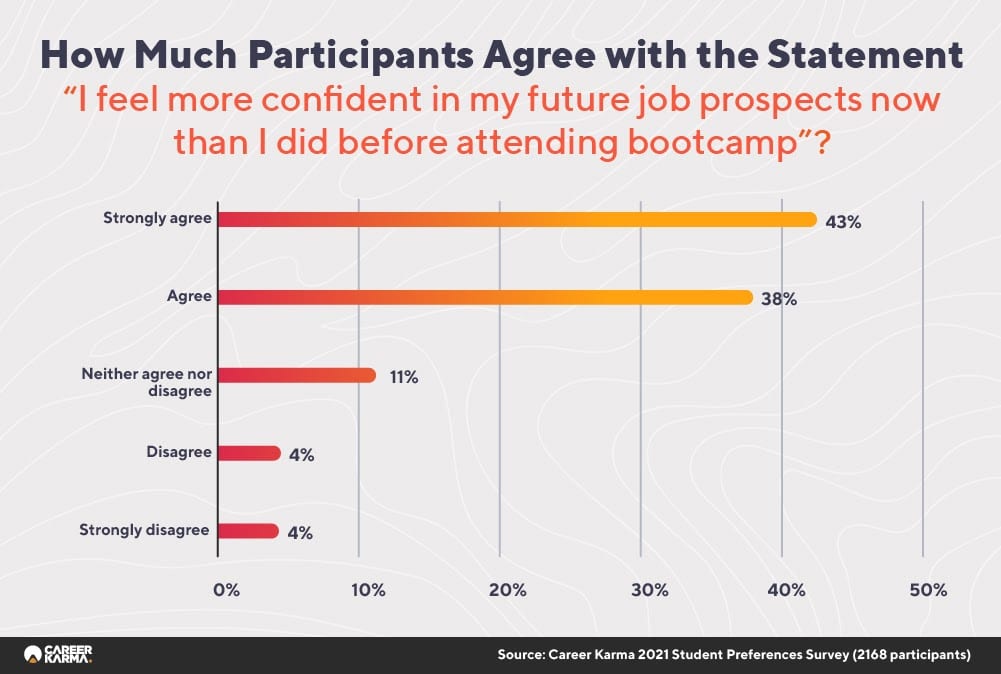
How much do you agree with the statement, “My bootcamp education was worth the cost”?
On the whole, bootcamp graduates have a lot of confidence in the value of their bootcamp education. About 68 percent of respondents agreed or strongly agreed with the statement, “My bootcamp education was worth the cost.” A further 16 percent neither agreed nor disagreed.
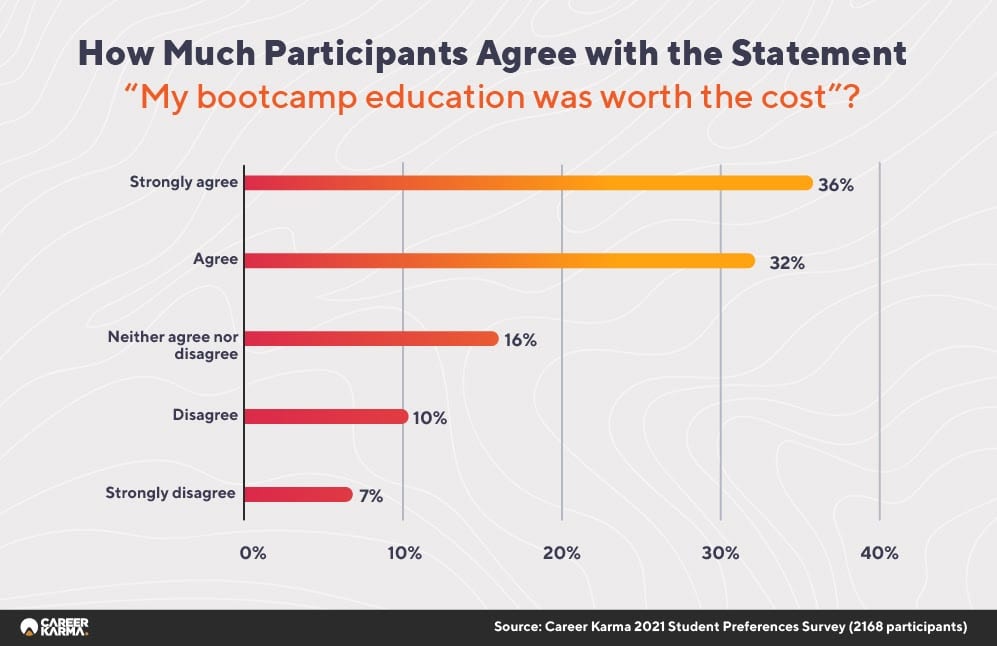
Would you recommend attending bootcamp to a friend?
Recommending a training program to a friend is a big sign of trust and faith in that program. We asked our survey participants whether they would recommend bootcamp to a friend, with 84.35 percent of respondents saying that they would. This provides further evidence that bootcamp graduates believe going to a bootcamp was worth it.
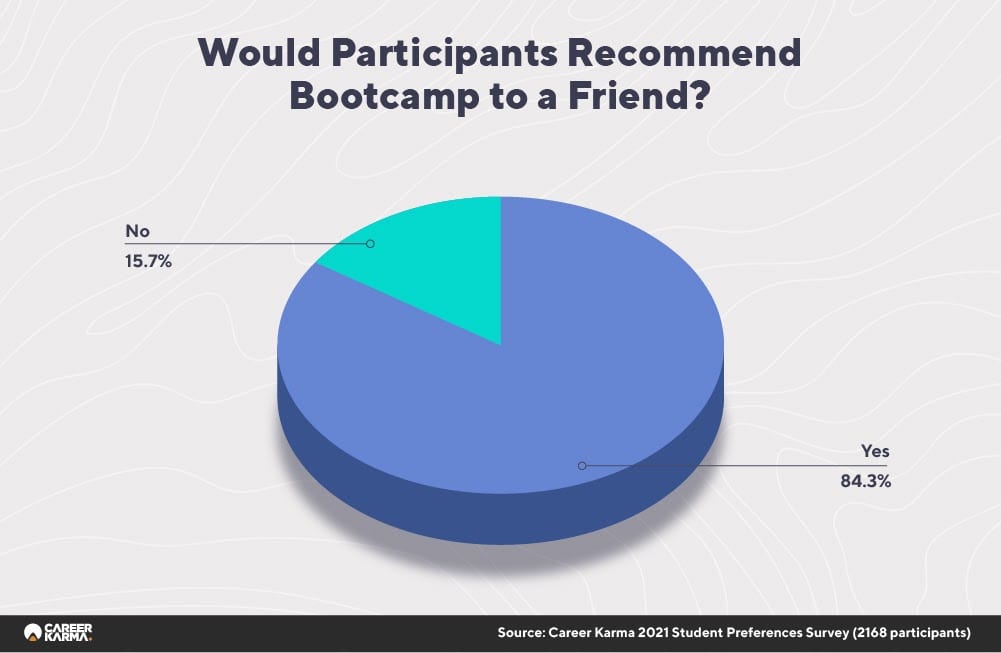
Experience Applying to Bootcamp
The following questions were answered by the 595 applicants who filled out the survey.
How many bootcamps have you applied to?
The average bootcamp applicant in our survey has applied to 1.5 bootcamps. We must note that applicants may still be applying to bootcamps, so the real number may be slightly higher.
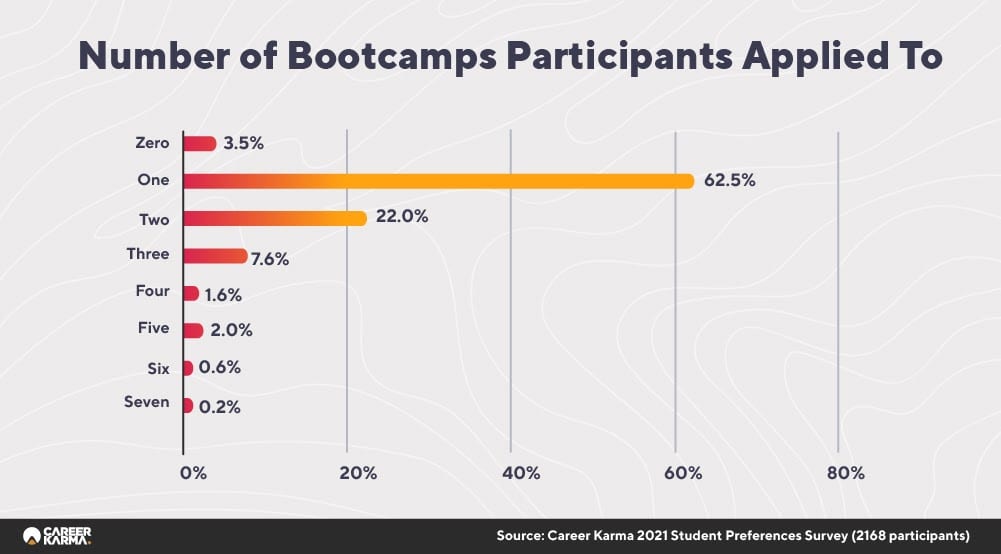
On average, how long did you spend filling out your initial application for each bootcamp to which you have applied?
Initial bootcamp applications, which are the first of a few stages in the bootcamp application and enrollment process, do not take much time to complete on average.
Of our respondents, 39 percent said they spent between 15 and 30 minutes filling out their initial application, which was the most popular response to this question. In total, about 91 percent of respondents said they filled out their first application in one hour or less.
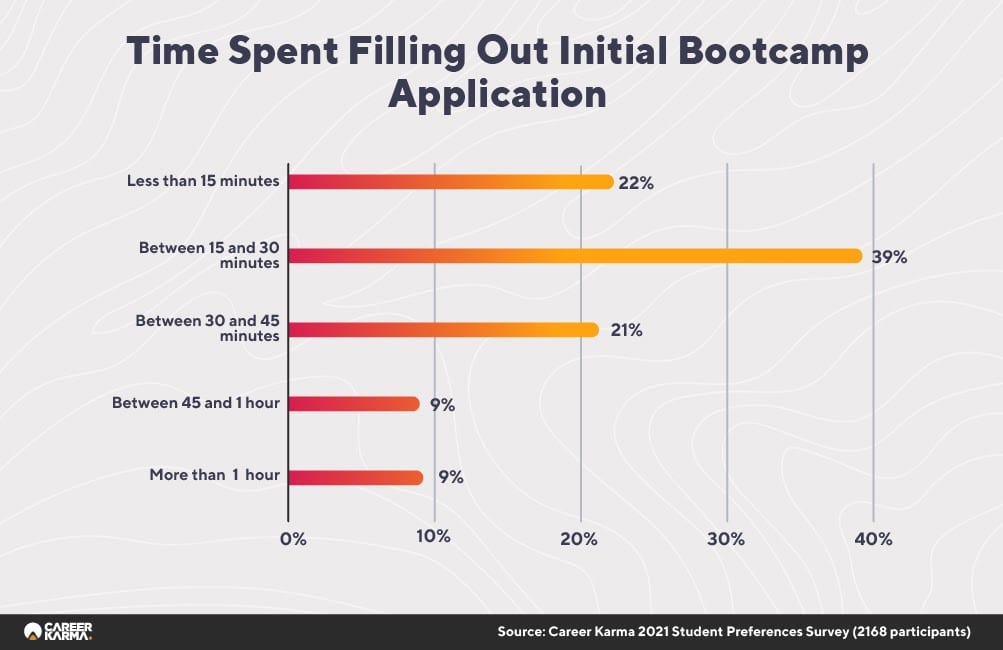
How much time did you spend thinking about going to bootcamp before submitting your first application?
Deciding to submit one’s first application to a bootcamp takes everyone a different amount of time. However, a majority of people spend less than a month deliberating before submitting their first application.
About 66 percent of respondents indicated they spent one month or less thinking about going to bootcamp before submitting their first application.
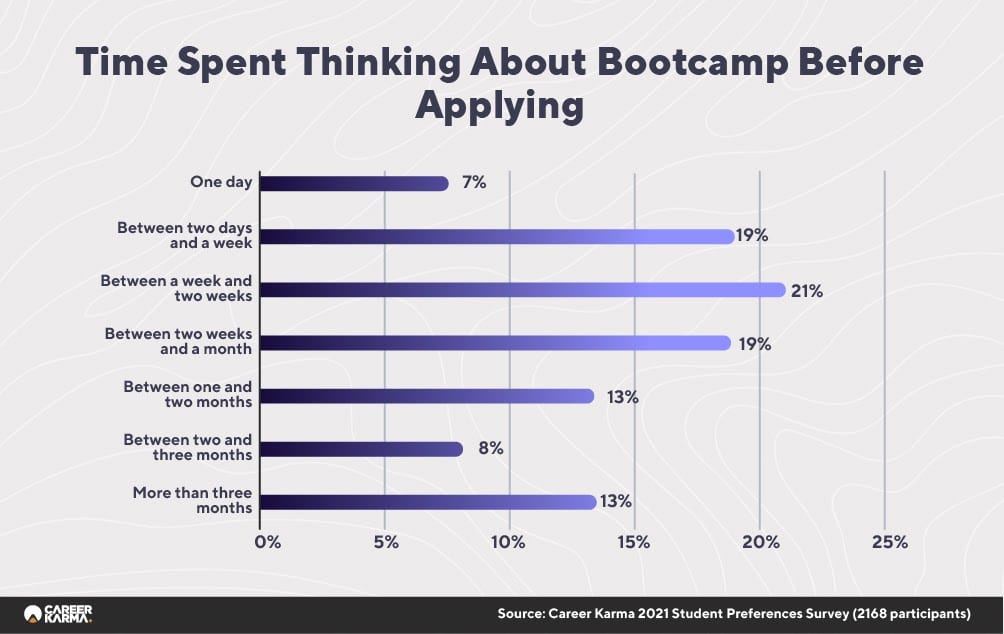
Have you been accepted into a bootcamp?
To put our application figures in context, we asked respondents to tell us if they had been accepted into a bootcamp, and 88.7 percent of respondents said they had been accepted.
This means that the vast majority of our data on applicants accounts for people who have already been accepted into a bootcamp but have not yet started their program.
We should note that many of the participants in our survey were likely Career Karma community members. As Career Karma offers coaching and mentorship services that help people get accepted into a bootcamp, our study may show a higher acceptance rate than a random sample of applicants.
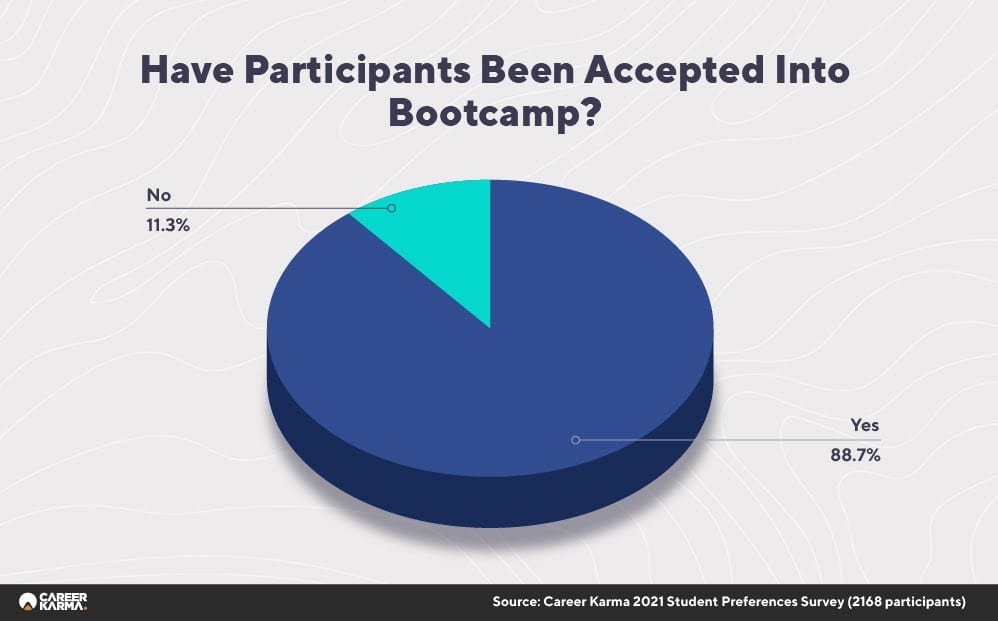
How long did the application process take from start to finish?
We asked all applicants who said they had been accepted into a bootcamp how long the application process took them from start to finish. About 90 percent of respondents said the application process took one month or less. This shows that the time frame between first applying to a bootcamp and being accepted into the bootcamp is short for most people.
Many survey participants are likely part of the Career Karma community. Career Karma offers a FastTrack matching service, which helps applicants find schools with which to engage. The average application process would likely take longer for a random student who did not use the Career Karma FastTrack service.
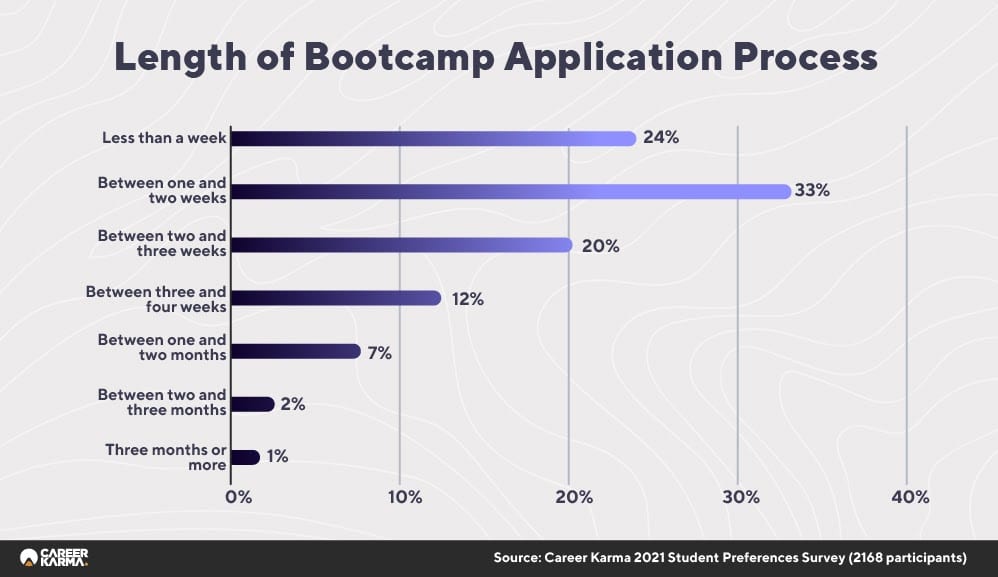
Were you asked to complete any pre-work before being accepted into bootcamp?
We also asked all applicants who have been accepted into a bootcamp to tell us if they were asked to complete any “pre-work” before being accepted. Pre-work refers to exercises one must complete before actually starting a bootcamp program.
Of those already accepted, 84.7 percent said they were asked to complete pre-work. This shows that if you are interested in going to bootcamp, there is a very high chance you will be asked to complete some pre-work tasks before you start your program.
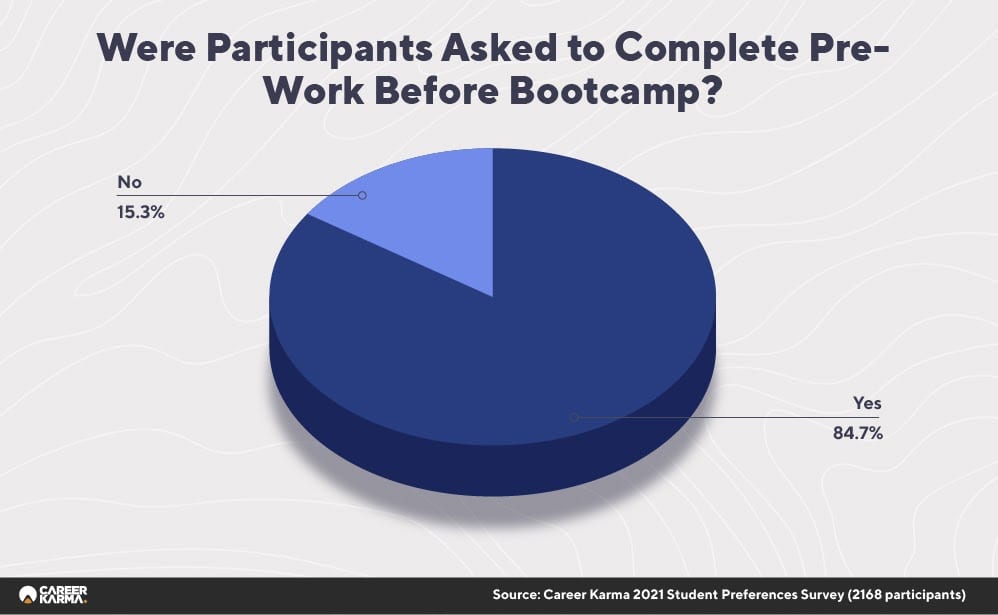
Learning Formats, COVID Confidence, and Application Support
Toward the end of the survey, we asked all participants to fill out three questions on learning formats, returning to the classroom after more people have been vaccinated against COVID-19, and what forms of support students, applicants, and grads would have liked in the application process.
What learning format would you prefer the bootcamp at which you study or plan to study offer?
Despite the COVID-19 pandemic, respondents are still interested in attending in-person programs. About 43 percent of respondents said they would prefer to study in person. Another 36.6 percent of respondents indicated they would be comfortable with a hybrid “mix of in-person and online instruction” approach. Thus, it is clear that in-person learning is here to stay.
There remains some interest in online education as well. The fact that so many people would like a hybrid approach, as well as the fact 20.4 percent of respondents stated they would prefer to learn online, tells us that bootcamps should keep investing in online education to cater to current applicant interests.
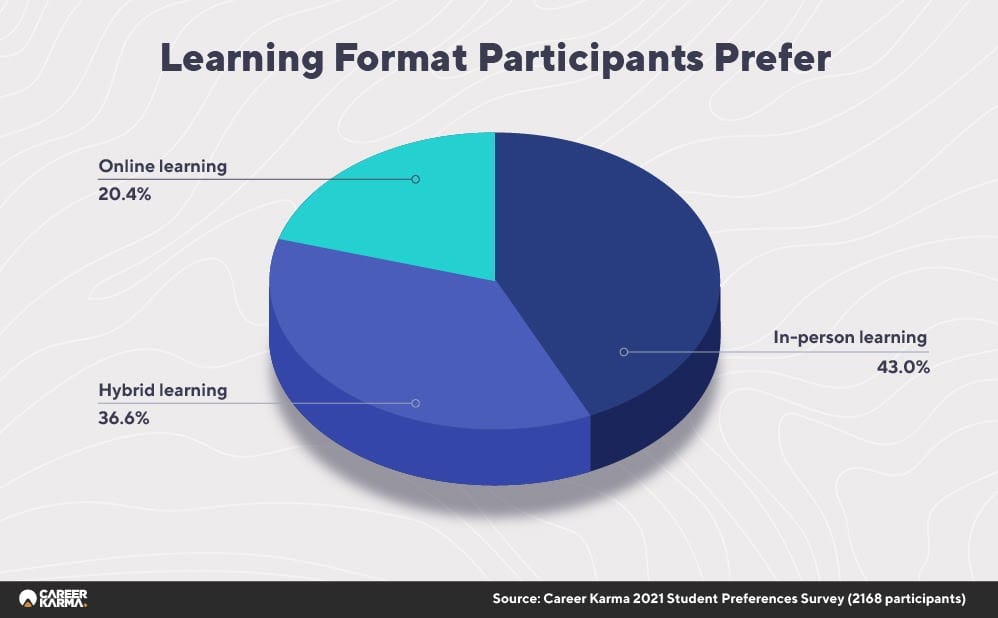
Would you feel comfortable studying in person as more people are vaccinated against COVID-19?
Over the past year, a top concern for bootcamps, students, and applicants alike has been the safety of studying in person. We wanted to know how people would feel about studying in person as more COVID-19 vaccines are administered.
Of our respondents, 73.3 percent said they would feel comfortable studying in person as more people are vaccinated. A further 17.7 percent said they were unsure, which indicates that there are still people who are not convinced that studying in person is a viable option just yet.
Despite the high confidence rates for studying in person as more people are vaccinated, we must remember that a high percentage of learners are still interested in online and hybrid learning.
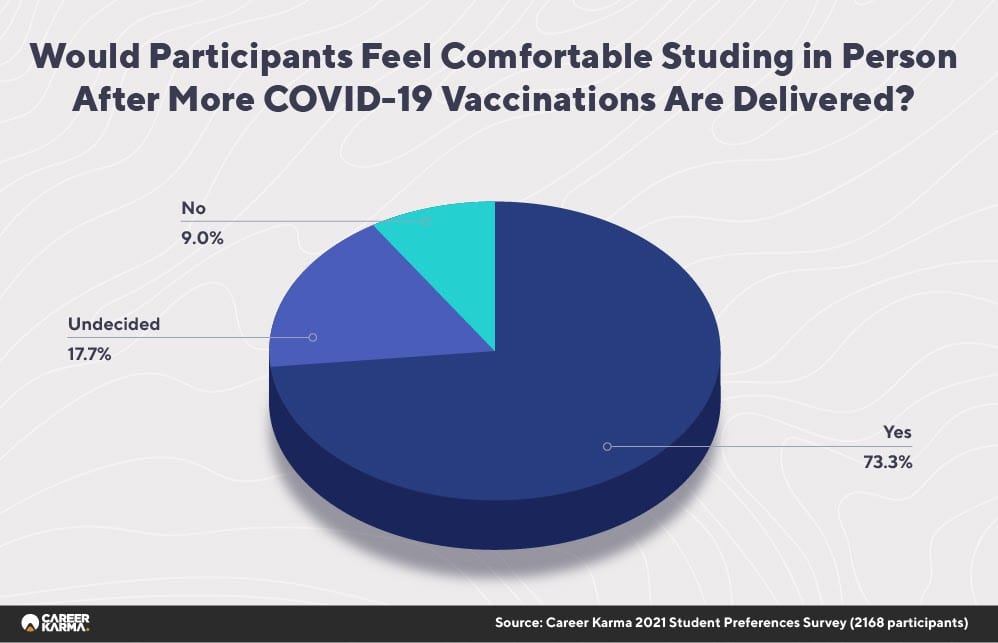
What support do you wish you could have had during the research and application process of finding a bootcamp to attend?
As the bootcamp market has grown in size, so too has the amount of information available to prospective students. However, we wanted to know if there was more that could be done to support applicants through the application process.
The top service applicants wish they could have had was the “Ability to speak directly with alumni.” While 52.9 percent of respondents indicated interest in this service, there was also significant interest in the other seven options we provided. This shows that there is more that can be done to support applicants in their search for a bootcamp program.
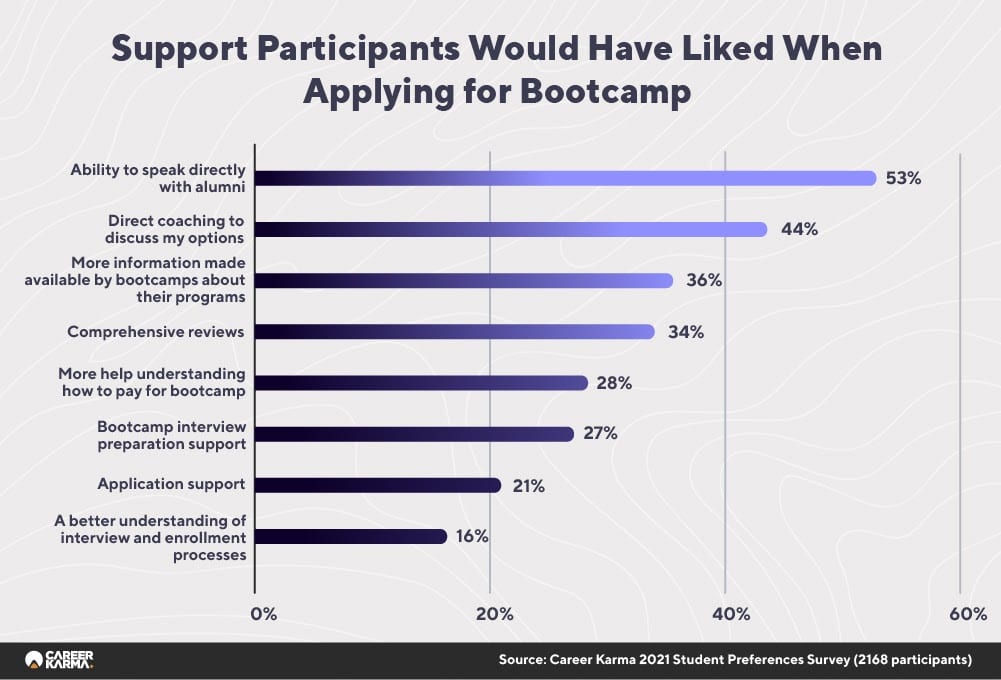
Survey Demographics
Our demographics data represents students and graduates only. Applicants were not asked to provide demographics information in our survey.
What industry did you work in before attending bootcamp?
Using Bureau of Labor Statistics industry classifications, we asked respondents to tell us what industry they worked in before attending their bootcamp.
Aside from “Other,” which was the top response to this question, “Arts, Design, Entertainment, Sports, and Media Occupations” was the top industry our respondents worked in before attending their bootcamp.
Students and graduates who filled out this section came from 22 occupations (excluding those listed as “Other”). This shows that there is no one set of careers from which people come before they attend a bootcamp. Bootcamp students come from a diverse range of industries, from “Management Occupations” to “Education, Training, and Library Occupations.”
The table below shows the industries in which participants worked before attending a bootcamp.
| Industry Classification | Percentage of Students and Graduates |
| Arts, Design, Entertainment, Sports, and Media Occupations | 14.5% |
| Business and Financial Operations Occupations | 9.1% |
| Office and Administrative Support Occupations | 8.1% |
| Sales and Related Occupations | 8.0% |
| Computer and Mathematical Occupations | 7.7% |
| Education, Training, and Library Occupations | 7.3% |
| Architecture and Engineering Occupations | 7.0% |
| Food Preparation and Serving Related Occupations | 4.1% |
| Management Occupations | 3.7% |
| Healthcare Practitioners and Technical Occupations | 2.6% |
| Construction and Extraction Occupations | 2.3% |
| Life, Physical, and Social Science Occupations | 1.8% |
| Healthcare Support Occupations | 1.8% |
| Transportation and Materials Moving Occupations | 1.6% |
| Installation, Maintenance, and Repair Occupations | 1.2% |
| Production Occupations | 1.1% |
| Legal Occupations | 1.1% |
| Community and Social Service Occupations | 1.0% |
| Personal Care and Service Occupations | 0.7% |
| Building and Grounds Cleaning and Maintenance Occupations | 0.7% |
| Protective Service Occupations | 0.3% |
| Farming, Fishing, and Forestry Occupations | 0.1% |
What is your current job title?
We asked bootcamp graduates to tell us their current job titles so we could learn more about the sorts of jobs bootcamp graduates go on to do. We found that web development and software engineering were the two most common job titles among our respondents. However, respondents indicated they worked in a wide range of other fields.
In the chart below, we list the 10 most common job titles held by our respondents.
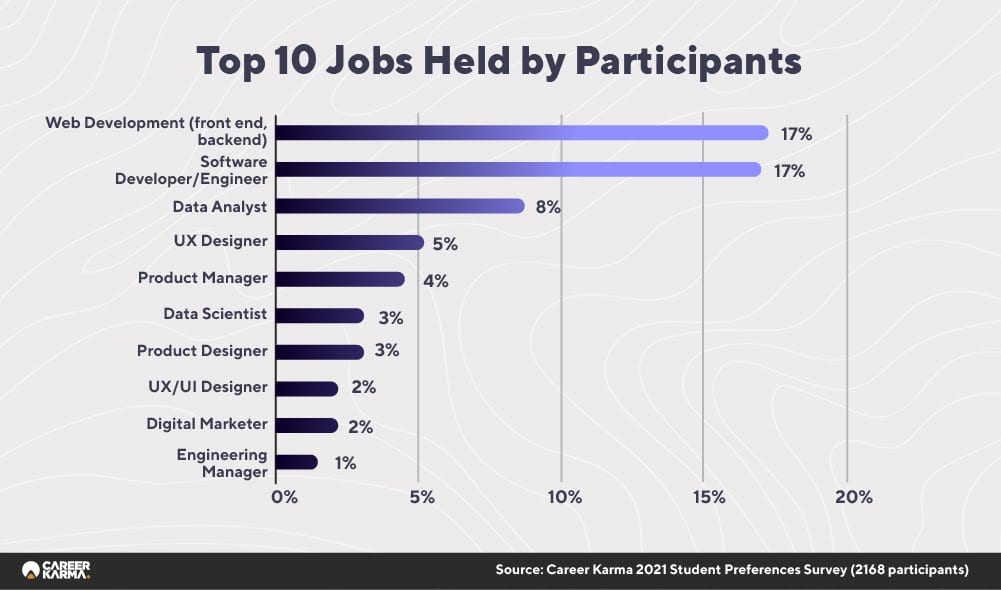
When did you enroll in bootcamp?
Our survey represents students and graduates who have attended bootcamp since 2012. Slightly over one-third of respondents enrolled in a bootcamp in 2020, which was the most common response. A total of 87 percent enrolled in bootcamp between 2018 and 2021.
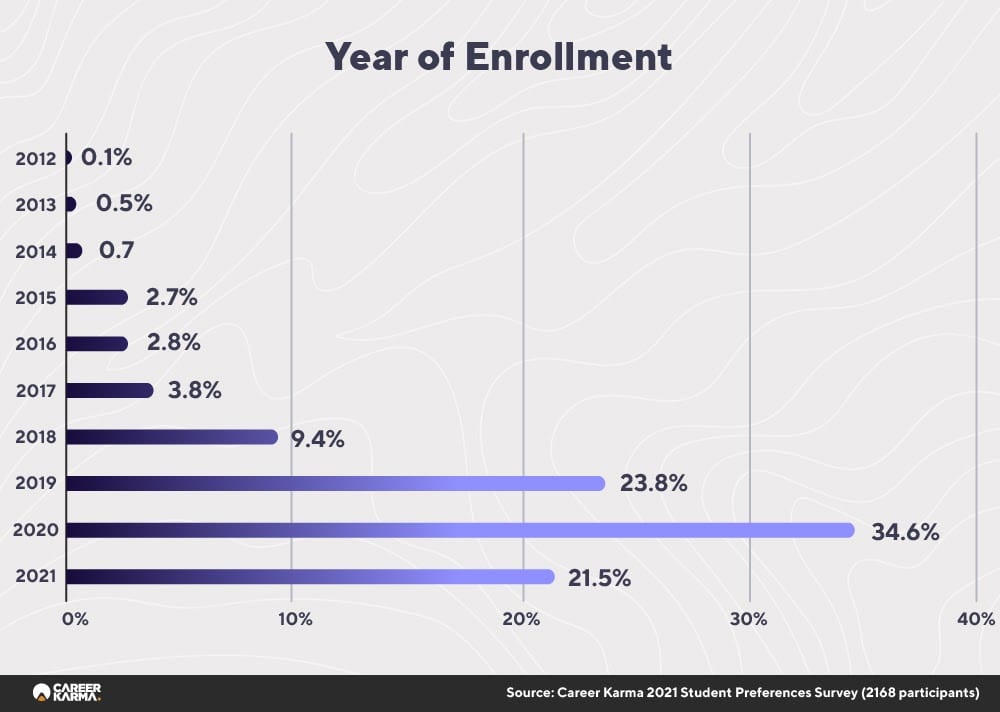
What field are you studying or did you study?
The most popular field that our respondents studied was web development (either front end, backend, or full stack web development).
However, our survey respondents studied a range of fields at their bootcamps, as noted in the chart below. A total of 13 fields were represented outside of the “Other” responses.
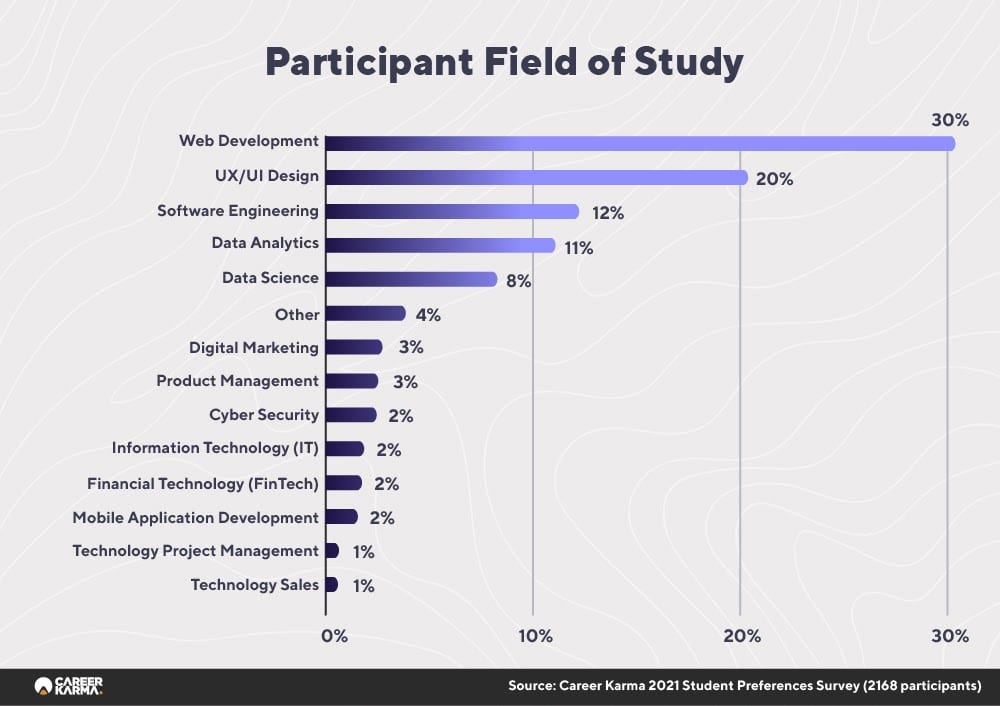
How would you best describe yourself?
Our study accounts for students and graduates from a range of races and ethnic groups. About 50 percent of respondents described themselves as “White” and 42.7 percent placed themselves in a non-white group (excluding “Other” and “I prefer not to state”).
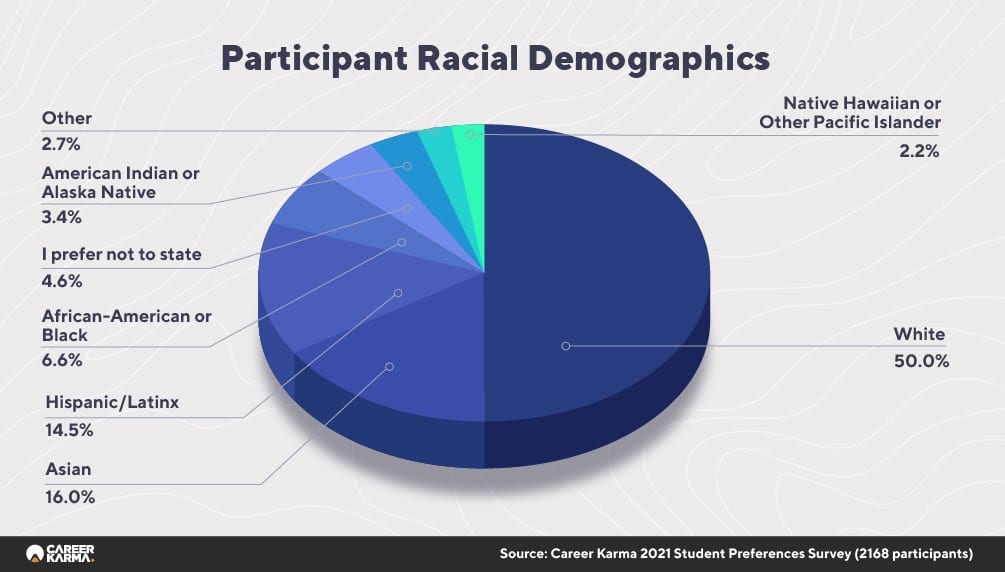
Which gender identity do you most identify with?
Of our respondents, 46.6 percent were male and 46.5 percent were female. A further 2.2 percent said they were gender non-conforming and 1.6 percent identified as transgender.
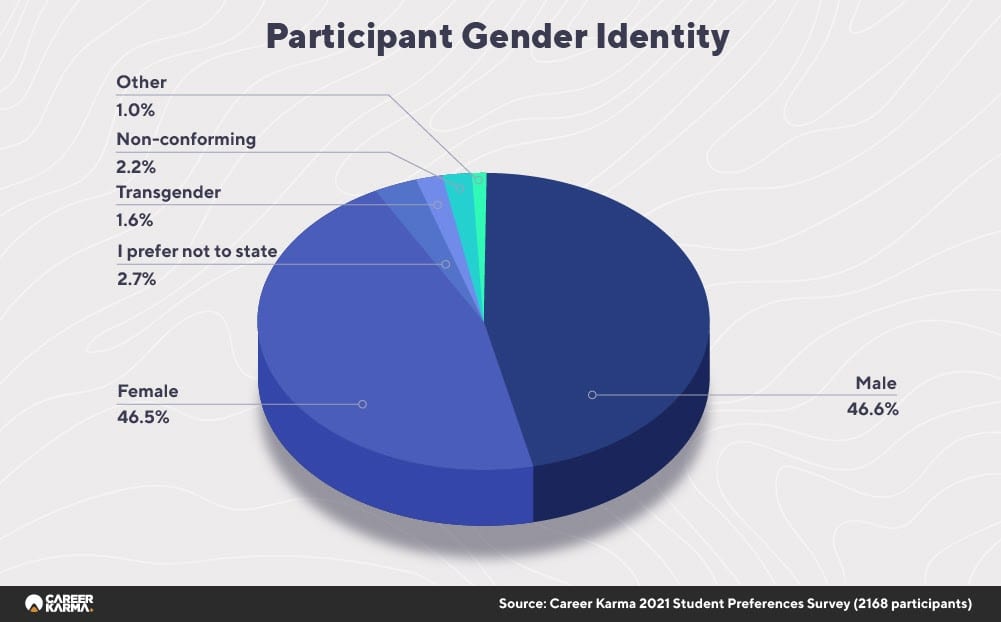
What age are you?
Bootcamps are seen by many as a way to transition careers and so we did not expect to get many responses from young adults or from people who are already most of the way through their careers. Our findings are consistent with our expectations.
The “31-40” age group is the one most represented in our survey, a group with which 36.7 percent of our respondents identify. A total of 96.8 percent of respondents were 21 or older. Only 3.4 percent of respondents were over 50, which suggests that bootcamps are not widely used by people who are further along in their careers.
Notably, people between the ages of 26 and 30 account for almost as many responses as people between the ages of 31 and 40. This tells us that bootcamps are popular across the “mid-career” spectrum, the time in people’s lives when they are likely to have worked in at least one career and are looking for a change. This is consistent with responses to our “How many careers have you pursued before attending bootcamp?” question, discussed later in this section.
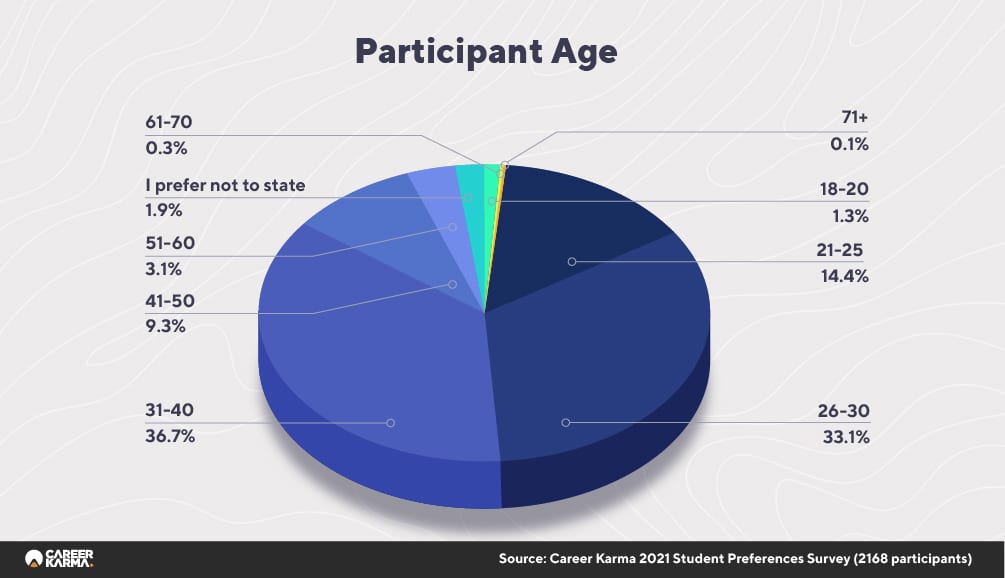
What was the highest level of education you completed prior to attending bootcamp?
Bootcamps are not just an option for people who have no educational background or prior training in a field. In fact, we found that most people who go to a bootcamp have participated in some post-secondary education.
About 87 percent of respondents who have gone to a bootcamp have also taken part in some post-secondary, formal education (e.g., bachelor’s degree, master’s degree, some university, associate degree, or doctoral degree). About 74 percent of respondents had attained a degree.
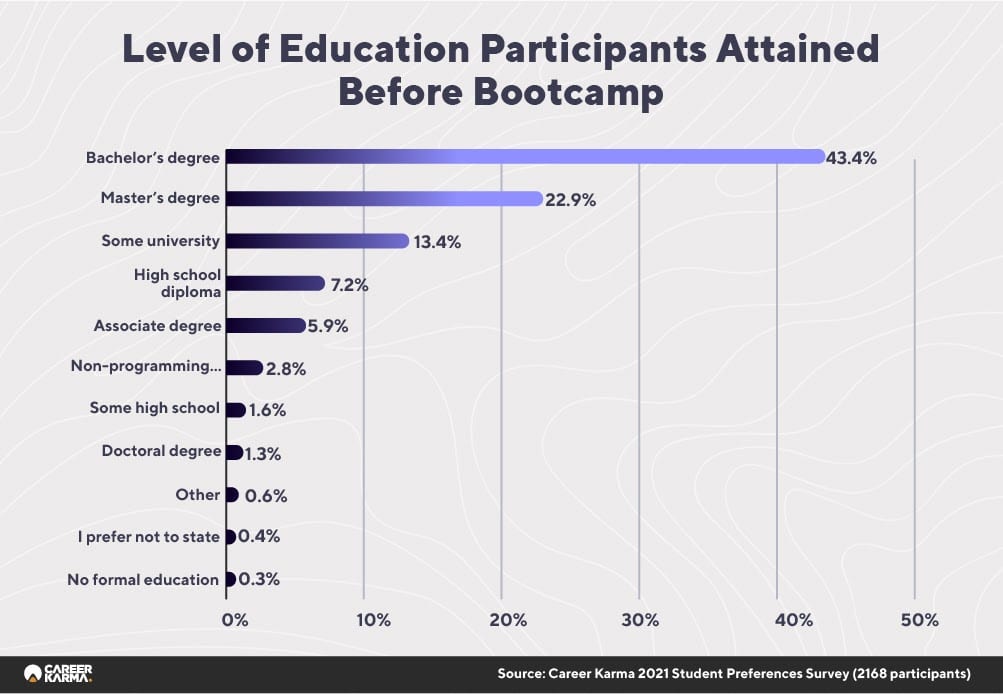
How many careers have you pursued before attending bootcamp?
The average participant had pursued 1.8 careers before attending a bootcamp. About 77 percent of respondents had pursued one or two careers before attending a bootcamp. Because most respondents had pursued at least one career before joining a bootcamp, we can see that bootcamps are more appealing to adult career transitioners than recent college graduates.
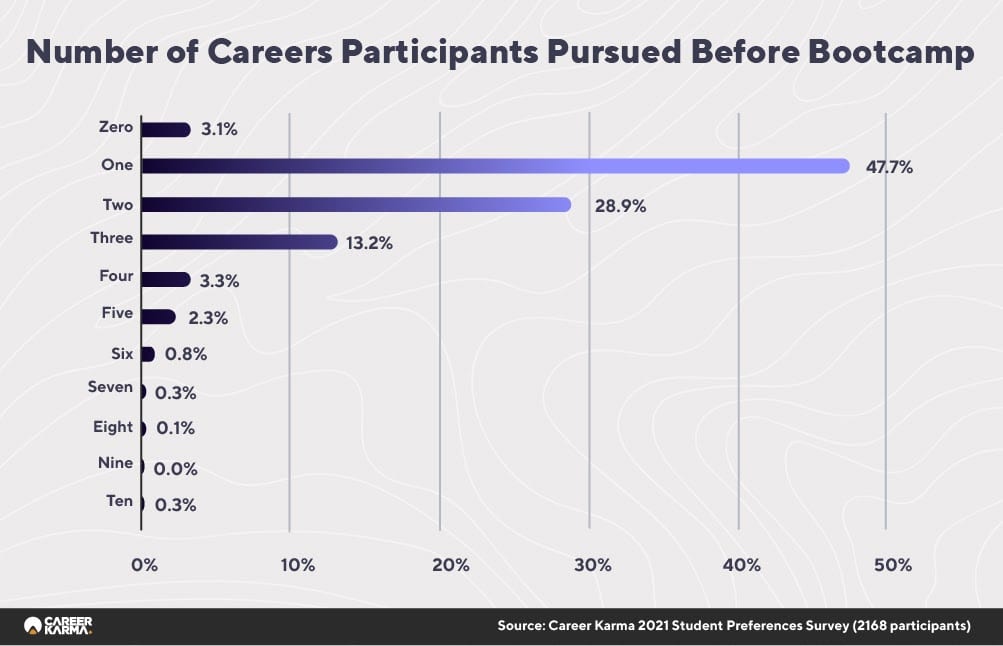
Which of the following best describes the area in which you live(d) during bootcamp?
People from urban areas were most represented in our survey. About 63 percent of respondents lived in an urban area. A further 29 percent of respondents said they lived in a suburban area. This shows that the majority of people who go to a bootcamp live in a more densely populated area when they study.
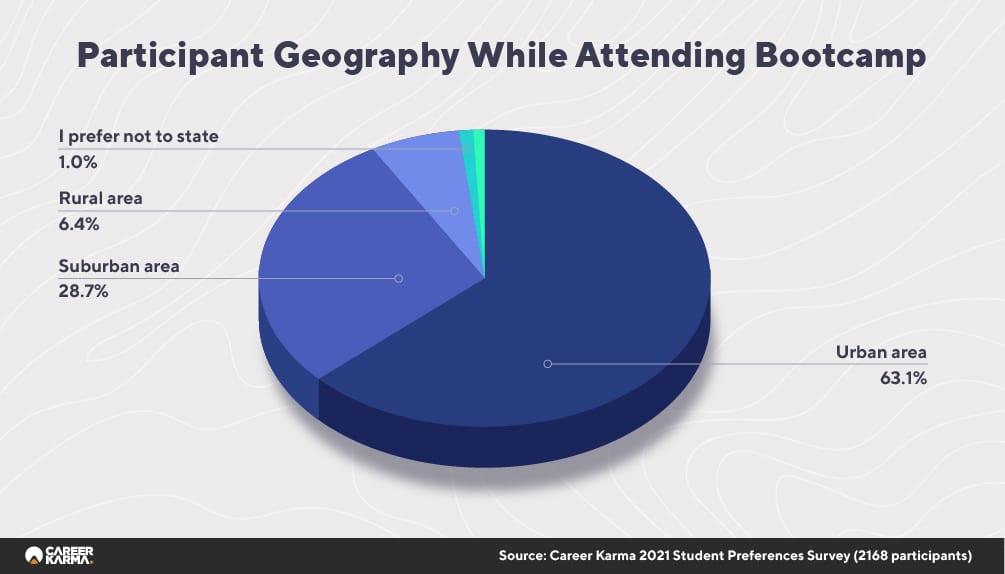
Conclusion: Looking Forward
Over the last decade, bootcamps have become an established method of training. In this study, we found that bootcamps have a tangible impact on the careers of many students and graduates. For instance, we found that bootcamp graduates tend to earn higher salaries than they earned before studying at a bootcamp.
From what we have learned, we believe a few trends will emerge. First, we believe there will be a renewed focus on in-person learning. Our study indicated a large percentage of people would like to see either in-person or hybrid learning despite the fact most bootcamps have offered online services over the last year. The fact a majority of people said they would feel comfortable studying in person after vaccines are rolled out provides further evidence in support of this point.
Second, we believe bootcamps will become more accepted in the future. About 81 percent of respondents said they felt more confident in their job prospects after graduating than they did before attending a bootcamp. Furthermore, 64 percent of people said they felt their bootcamp prepared them well for their first job. Finally, 84 percent of respondents said they would recommend bootcamps to a friend.
Lastly, we think there are opportunities to streamline the application process. Respondents indicated they would like to see a number of services made available during the application process that were not available to them.
Overall, we feel confident in the future of bootcamps. We believe in the efficacy of the bootcamp model when administered carefully, and we are excited to see how the market evolves over the next few years.
Conflict of Interest Disclosure
Career Karma matches career switchers to bootcamps and job training programs. Career Karma is paid by bootcamps to help prospective students prepare for and get accepted into a training program based on their needs. In writing this paper, the author acknowledged this conflict of interest and took appropriate action to ensure the paper’s findings were not influenced by any relationships with Career Karma partners, affiliates, or external stakeholders.
James Gallagher, the Career Karma main researcher assigned to this project, was given autonomy over the direction of this survey and the final authority on decisions pertinent to the content of this paper.
The data in this report cannot be considered representative of the outcomes of any particular bootcamp due to the size of the bootcamp market relative to our study. Our data is not segmented by school anywhere in this survey.
Citation
In academic work, please cite document as:
Gallagher, J. (2021). 2021 Bootcamp Preferences Survey. Career Karma: https://careerkarma.com/blog/bootcamp-preferences-survey-2021/
Acknowledgments
The author would like to thank the following colleagues who assisted with this project:
Alex Consiglio, Marc Juberg, Galina Bakinova, Artur Meyster, Naveed Lalani, Ruben Harris, Vinit Shah, Timur Meyster, Nicole Maske, Sonja Sierra, and Shanaz Chowdhery.
See Other Reports
The Career Karma team has written other reports and guides on bootcamps, income share agreements, and bootcamp financing. Check out some of our other reports and guides below.
State of the Bootcamp Market 2021 Report
In this report, James Gallagher analyzes the bootcamp market with reference to alumni statistics, tuition, acquisition and venture capital activity, and more. James also comments on various trends emerging in the bootcamp market.
How to Pay for Coding Bootcamp Guide
This Career Karma guide features extensive information on the financing options available to those who want to attend a bootcamp. This guide contains information on, among other options, income share agreements, bootcamp loans, GI Bill credits, and more.
Appendix A: Schools Represented
We asked students and graduates who filled out our survey to tell us what school they are attending or did attend. We gave participants a dropdown box from which they could select a school, based on the schools in the Career Karma directory.
Students and graduates from 106 schools filled out our survey and gave a response that was on our dropdown list. A further 63 schools were given as responses to the “Other” option.
Please note this survey is not indicative of the performance of any one bootcamp and we do not and cannot comment on the efficacy or outcomes of any individual program. The list of schools is provided for context, but the data in this survey is not representative of any one school. Rather, it reflects the aggregate performance of all our survey respondents.
Below is a list of the 106 schools represented in the survey (excluding the “Other” schools).
| School Name |
| 42 |
| 4Geeks Academy |
| Academia Hack |
| Academy X |
| acaDev |
| Actualize |
| Ada Developers Academy |
| Afterskills |
| Alchemy Code Lab |
| Altcademy |
| AltCampus |
| AlwaysHired |
| Andela |
| App Academy |
| Array School of Technology and Design |
| ASI Data Science |
| Austin Coding Academy |
| Automation Workz |
| Awesome Inc U |
| Bethel Tech |
| Bloc – Now “Thinkful” |
| Bogota Bootcamp |
| BoiseCodeWorks |
| Bottega University |
| BrainStation |
| Byte Academy |
| Cambridge Spark |
| CareerFoundry |
| CEI Bootcamp |
| Claim Academy |
| Code Chrysalis |
| Code Fellows |
| Code Institute |
| CodeBoxx |
| Codecool |
| CodeOp |
| CodePath |
| Codesmith |
| Codeworks |
| Coding Dojo |
| Coding Temple |
| Data Science Dojo |
| Dataquest |
| DevBootcamp |
| Devmountain |
| Digital Creative |
| DigitalCrafts |
| Eleven Fifty Academy |
| Epicodus |
| Flatiron School |
| Fullstack Academy |
| Galvanize |
| General Assembly |
| Grand Circus |
| Hack Reactor |
| Hackbright Academy |
| Hacktiv8 |
| Holberton School |
| Impact Byte |
| Inventive |
| Ironhack |
| KeepCoding |
| Kenzie Academy |
| Kickstart Coding |
| Lambda School |
| Launch Academy |
| Le Wagon |
| LEARN Academy |
| LearningFuze |
| Lighthouse Labs |
| Magnimind |
| MediaTech Institute |
| Metis |
| Microverse |
| Nashville Software School |
| Noble Desktop |
| Nucamp |
| Nuclio School |
| Pivot Technology School |
| Plataforma 5 |
| Practicum by Yandex |
| Prehired |
| Prime Digital Academy |
| Product Gym |
| Product School |
| Propulsion Academy |
| Redwood Code Academy |
| Rithm School |
| RMOTR |
| S.O. Accelerated Learning |
| Sabio |
| San Diego Code School |
| Science to Data Science |
| Shillington |
| Springboard |
| Tech Elevator |
| The Software Guild |
| The Tech Academy |
| Thinkful |
| Turing |
| Udacity |
| Upgrade Hub |
| UX Design Institute |
| V School |
| Wyncode Academy |
Appendix B: Survey Questions
Below is a list of all the survey questions that we analyzed for this report. The survey sections above indicate which questions were shown to which segment of respondents.
Survey Questions
Why did you decide to apply to join a bootcamp program?
Did you consider getting a traditional four-year computer science degree before applying to bootcamp?
How did you finance your bootcamp education?
Which of the following career services have been or were offered to you during your bootcamp education?
Which of the following career services have you taken advantage of or did you take advantage of in your bootcamp education?
Which of the following programming services have been offered to you or were offered to you during your education?
Which of the above programming services have you taken advantage of or did you take advantage of in your bootcamp education?
How long did it take you to enroll in bootcamp, from starting your research to being accepted?
Which of the following were influential in your search for a bootcamp program to attend?
Which of the following best describes your work status?
Is your current job related to your field of study at bootcamp?
How much do you currently earn per year?
How much did you earn before attending bootcamp?
How many months did you spend transitioning careers, from deciding to attend bootcamp to finding your first job?
Approximately how many months were there between you graduating the bootcamp and finding a job related to your field of study at bootcamp?
How much do you agree with the statement, “Bootcamp prepared me well for my first job”?
How much do you agree with the statement, “I feel more confident in my future job prospects now than I did before attending bootcamp”?
How much do you agree with the statement, “My bootcamp education was worth the cost”?
Would you recommend attending bootcamp to a friend?
How many bootcamps have you applied to?
On average, how long did you spend filling out your initial application for each bootcamp to which you have applied?
How much time did you spend thinking about going to bootcamp before submitting your first application?
Have you been accepted into a bootcamp?
How long did the application process take from start to finish?
Were you asked to complete any pre-work before being accepted into bootcamp?
What learning format would you prefer the bootcamp at which you study or plan to study offer?
Would you feel comfortable studying in person as more people are vaccinated against COVID-19?
What support do you wish you could have had during the research and application process of finding a bootcamp to attend?
What industry did you work in before attending bootcamp?
What is your current job title?
When did you enroll in bootcamp?
What field are you studying or did you study?
How would you best describe yourself?
Which gender identity do you most identify with?
What age are you?
What was the highest level of education you completed prior to attending bootcamp?
How many careers have you pursued before attending bootcamp?
Which of the following best describes the area in which you live(d) during bootcamp?
About us: Career Karma is a platform designed to help job seekers find, research, and connect with job training programs to advance their careers. Learn about the CK publication.



